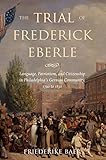The Trial of Frederick Eberle : Language, Patriotism and Citizenship in Philadelphia's German Community, 1790 to 1830 / Friederike Baer.
Material type: TextPublisher: New York, NY : New York University Press, [2008]Copyright date: ©2008Description: 1 online resourceContent type:
TextPublisher: New York, NY : New York University Press, [2008]Copyright date: ©2008Description: 1 online resourceContent type: - 9780814799802
- 9780814789940
- 306.44089/31074811
- online - DeGruyter
| Item type | Current library | Call number | URL | Status | Notes | Barcode | |
|---|---|---|---|---|---|---|---|
 eBook
eBook
|
Biblioteca "Angelicum" Pont. Univ. S.Tommaso d'Aquino Nuvola online | online - DeGruyter (Browse shelf(Opens below)) | Online access | Not for loan (Accesso limitato) | Accesso per gli utenti autorizzati / Access for authorized users | (dgr)9780814789940 |
Browsing Biblioteca "Angelicum" Pont. Univ. S.Tommaso d'Aquino shelves, Shelving location: Nuvola online Close shelf browser (Hides shelf browser)

|

|

|

|

|

|

|
||
| online - DeGruyter Living through the Hoop : High School Basketball, Race, and the American Dream / | online - DeGruyter Hooking Up : Sex, Dating, and Relationships on Campus / | online - DeGruyter How the University Works : Higher Education and the Low-Wage Nation / | online - DeGruyter The Trial of Frederick Eberle : Language, Patriotism and Citizenship in Philadelphia's German Community, 1790 to 1830 / | online - DeGruyter Dreaming in the World's Religions : A Comparative History / | online - DeGruyter Elijah Muhammad and Islam / | online - DeGruyter Words upon the Word : An Ethnography of Evangelical Group Bible Study / |
restricted access online access with authorization star
http://purl.org/coar/access_right/c_16ec
In the summer of 1816, the state of Pennsylvania tried fifty-nine German-Americans on charges of conspiracy and rioting. The accused had, according to the indictment, conspired to prevent with physical force the introduction of the English language into the largest German church in North America, Philadelphia's Lutheran congregation of St. Michael's and Zion. The trial marked the climax of an increasingly violent conflict over language choice in Philadelphia's German community, with members bitterly divided into those who favored the exclusive use of German in their church, and those who preferred occasional services in English. At trial, witnesses, lawyers, defendants, and the judge explicitly linked language to class, citizenship, patriotism, religion, and violence. Mining many previously unexamined sources, including German-language writings, witness testimonies, and the opinions of prominent legal professionals, Friederike Baer uses legal conflict as a prism through which to explore the significance of language in the early American republic. The Trial of Frederick Eberle reminds us that debates over language have always been about far more than just language. Baer demonstrates that the 1816 trial was not a battle between Americans and immigrants, or German-speakers and English-speakers. Instead, the individuals involved in the case seized and exploited English and German as powerful symbols of competing cultural, economic, and social interests.
Mode of access: Internet via World Wide Web.
In English.
Description based on online resource; title from PDF title page (publisher's Web site, viewed 01. Nov 2023)


